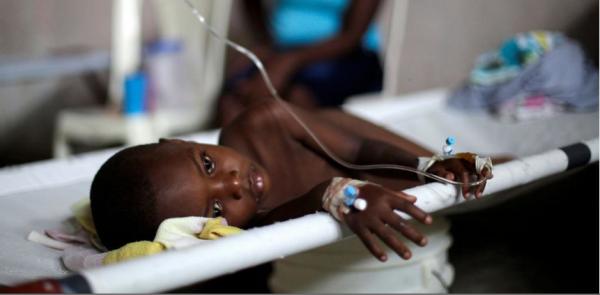The United Nations took responsibility for starting the cholera epidemic in Haiti that has killed over 9,000 people and sickened hundreds of thousands more. After six years, it admitted that it brought Vibrio cholerae, the bacteria that causes cholera, to Haiti when a peacekeepers battalion arrived from Nepal in October 2010.
Secretary General Ban Ki-moon made the U.N.'s culpability clear when he referred to the tragedy in his opening remarks to the General Assembly. While addressing world leaders in French, he spoke directly about the cholera epidemic while stressing the need for a new strategy.
"I have a lot of regret and sorrow for the terrible suffering of the Haitian people affected by cholera. A new strategy is needed to alleviate their distress and improve their living conditions. We are firmly resolved to fulfill this moral responsibility." he said, "Later, I will give you details on this strategy. Let us work together to meet our obligations to the Haitian people."
And now, with the damage from Hurricane Matthew, the situation will get much, much worse - and quickly. Because cholera is spread through contaminated water, the destruction brought by Matthew - devastating infrastructure and bringing in more water, is a one-two punch of the worst kind.
But, because hurricanes are not going to stop and cholera is not going to go away on its own, the UN needs to do what it should have done years ago. Today.
The next step in Haiti's crisis -- determining a strategy to rid Haiti of cholera -- will be a watershed moment for the U.N. Its officials must implement a new plan that will rid the Caribbean nation of the scourge that cholera has become. To do this, they must listen to the experts, one of whom is Dr. Renaud Piarroux, a Professor at the Université de la Méditerranée in Marseilles, France, who has been involved in the cholera outbreak in Haiti since the beginning.
Piarroux played a key role in conducting the investigation that originally linked the cholera outbreak to U.N. peacekeepers. With six years of experience in the field and at least a dozen trips to Haiti since the beginning of the outbreak, Dr. Piarroux provides striking clarity on what needs to be done and how to do it. He's been working with an international team of health experts from UNICEF, the World Health Organization and the Haitian government to develop a new draft of a strategy called "The National Plan for the Elimination of Cholera in Haiti," which was discussed in the corridors of the General Assembly a few weeks ago.
Having received a draft of this four-point plan, which has not been made public -- until now -- here's a summary of what the U.N. has in its hands.
First of all, "rapid response" is the strategy's most important component. This is the ability to detect outbreaks as soon as they happen by tracking every new case in the community. To implement this, a trained team needs to react to every case of cholera by traveling to the patient's village or town to quickly contain the infection and educate residents. Treat the family. And treat the water source with chlorine.
Dr. Piarroux is emphatic that rapid response is paramount and he knows that it's effective. Since this strategy was implemented in Haiti, the number of cholera cases has decreased. However, rapid response it the bare minimum of what needs to be done.
Second, cholera patients need to be effectively treated, which requires sustained funding for nurses and clinics.
Third, vaccinating Haiti's population of 10 million is critical, but prohibitively expensive. Delivering the current cholera vaccine, Shanchol, to everyone would cost $160 million, and there's not even enough vaccine doses to go around. Faced with these limitations, Dr. Piarroux and his colleagues believe vaccinating 2.5 million will have a significant effect.
Lastly, Haiti needs clean drinking water. Resources are required to increase and maintain access to safe water, most urgently in urban areas such as Mirebelais, where outbreaks are more likely and more common. And, better oversight and coordination in responding to the outbreaks will ensure greater success -- i.e. the left hand needs to know what the right hand is doing.
Those who are skeptical that cholera can be eradicated should look around the world, to places where the deadly disease no longer exists, despite past outbreaks. Madagascar, off the coast of Africa, is one success story. Ten years earlier, South America witnessed a large epidemic in the 1990s which resulted in roughly one million cases and 10,000 fatalities -- roughly Haiti's death toll right now -- and it doesn't exist there today.
It's a strong, effective plan, but the price tag of $180 million is high. That said, when you break something in a store, you have to buy it -- whether you can afford it or not. There are innocent people, many of them children, dying of a disease that is the result of the U.N.'s irresponsibility and negligence. It's time for the international body to give its health experts the financial support they need to correct the catastrophe it created.




